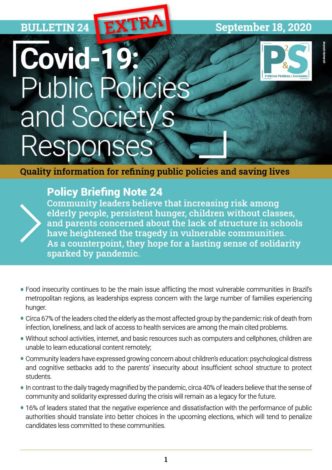Main results
- Food insecurity continues to be the main issue afflicting the most vulnerable communities in Brazil’s metropolitan regions, as leaderships express concern with the large number of families experiencing hunger.
- Circa 67% of the leaders cited the elderly as the most affected group by the pandemic: risk of death from infection, loneliness, and lack of access to health services are among the main cited problems.
- Without school activities, internet, and basic resources such as computers and cellphones, children are unable to learn educational content remotely;
- Community leaders have expressed growing concern about children’s education: psychological distress and cognitive setbacks add to the parents’ insecurity about insufficient school structure to protect students.
- In contrast to the daily tragedy magnified by the pandemic, circa 40% of leaders believe that the sense of community and solidarity expressed during the crisis will remain as a legacy for the future.
- 16% of leaders stated that the negative experience and dissatisfaction with the performance of public authorities should translate into better choices in the upcoming elections, which will tend to penalize candidates less committed to these communities.
Work group responsible
Coordination: Graziela Castello (CEBRAP), Priscila Vieira (CEBRAP) and Monise Picanço (CEBRAP)
Researchers
- Dafny Almeida (CEBRAP)
- Daniela Costanzo (CEBRAP)
- Jaciane Milanezi (CEBRAP)
- Jonatas Mendonça dos Santos (USP)
- Laura Simões (USP)
- Leonardo Fontes (CEBRAP)
- Rodrigo Brandão (USP)


